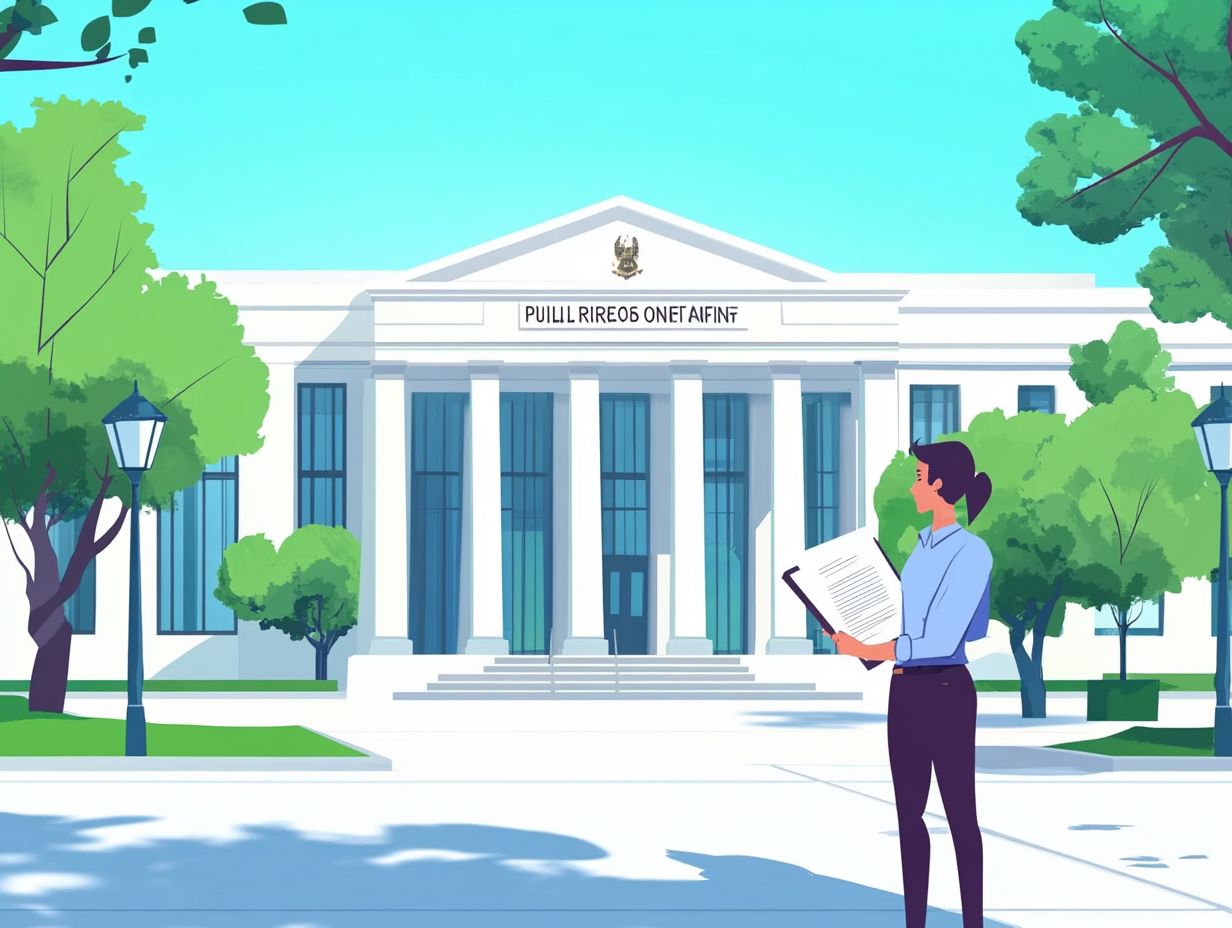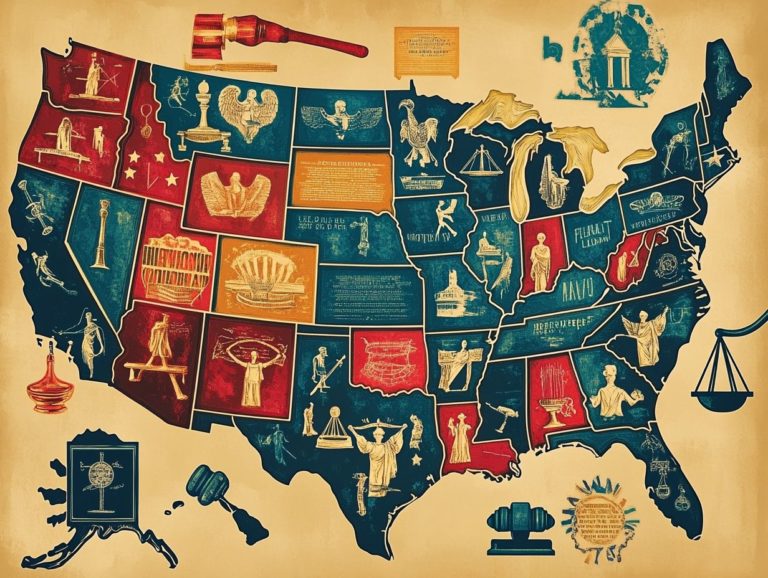The Right to Access Public Records
Access to public records is a fundamental pillar of democracy, empowering you as a citizen to hold your government accountable. Let s dive into this important topic!
But what exactly are public records, and why do they matter for transparency? This article delves into the essentials of accessing these important documents, covering legal frameworks like the Freedom of Information Act (FOIA), a law that lets people request access to government documents, and offering practical steps for making your request.
It also addresses the challenges and limitations you might encounter, alongside the significant influence public records wield over journalism, research, and society at large. Join in as you navigate the complexities of your right to know.
Contents
Key Takeaways:

Access to public records is a fundamental right that allows citizens to hold their government accountable and promote transparency! Laws such as FOIA and state regulations outline the process and requirements for requesting public records, but challenges and limitations may still arise. Despite obstacles and exemptions, the impact of access to public records on society is significant, serving as a tool for journalism, research, and promoting a more informed citizenry!
Understanding the Right to Access Public Records
Understanding your right to access public records requires navigating a complex landscape shaped by a variety of state and federal laws. These include the Freedom of Information Act (FOIA) and specific state statutes like the Indiana Access to Public Records Act and the Rhode Island APRA.
This right gives you the power to obtain information about government activities, fostering transparency and accountability within agencies.
Public records can encompass a diverse array of documents, from court records to financial reports. They are vital for informed citizenship and the public interest.
What are Public Records?
Public records encompass documents and pieces of information deemed non-confidential, maintained by government agencies. This includes everything from historical records to court documents, all of which are readily available for public access.
These records help you trust your government. You can easily access essential vital records, such as birth and death certificates, property records, and marriage licenses, which serve important legal and personal functions.
Court records, for instance, detail the legal proceedings and decisions made within the judicial system. They serve as a cornerstone of justice.
Thanks to the rise of information brokers, securing public records has never been more convenient. These entities simplify the process, ensuring you can easily access this wealth of information and uphold your rights and responsibilities within society.
Why is Access to Public Records Important?
Accessing public records is essential for upholding transparency laws and ensuring governmental accountability. It gives you the power to scrutinize the actions of public officials and agencies, fostering a culture of openness.
This access keeps you informed about local government decisions and instills a sense of civic responsibility within you and your community.
When you engage with these documents, you gain a clearer understanding of the policy-making processes. This enables you to make more informed voting decisions and actively participate in community discussions.
Public records also act as a check on power, ensuring that officials operate under oversight. This dynamic relationship between access to information and civic engagement underscores the invaluable role these records play in nurturing a vibrant democracy, where your voice is not just heard but also has the potential to impact the governance landscape.
Laws and Regulations Surrounding Public Records
Laws and regulations regarding public records differ significantly across various jurisdictions. At the federal level, key legislation like the Freedom of Information Act (FOIA) sets the groundwork. State-specific laws, such as the Indiana Access to Public Records Act, Rhode Island’s APRA, and the Minnesota Data Practices Act, further delineate the access and management of public records.
Understanding these frameworks is essential for navigating the complexities of public record access effectively.
Start your journey to transparency today! Request your public records!
Freedom of Information Act (FOIA)

The Freedom of Information Act (FOIA) is a crucial federal law that gives you the power to request access to records from any federal agency. This law increases transparency. It lets you submit FOIA requests to access important information.
As a citizen, journalist, or researcher, you can hold the government accountable by uncovering previously undisclosed documents think reports, meeting minutes, and communications.
Under FOIA, agencies must respond to your requests within set timeframes, usually around 20 business days. However, more complex cases might take longer.
Many agencies try to comply, but you might face challenges, such as hefty fees for processing requests or the withholding of information due to exemptions like national security or personal privacy concerns. Understanding these provisions is essential for effectively navigating the FOIA process and advocating for greater governmental transparency on your behalf.
Access to Records: State and Local Laws
State and local laws significantly shape your access to records, with regulations differing from state to state. Each state has its own rules, and exploring them can unlock hidden information!
Take, for instance, the Right to Know law and the Open Public Records Act; each offers unique provisions for accessing public records.
These laws often work hand-in-hand with federal statutes like FOIA, enhancing transparency while sometimes presenting their own sets of scopes and limitations.
For example, while FOIA allows requests for records from federal agencies, some states take things a step further with broader access under their laws. In California, the Public Records Act empowers you to obtain records from public agencies, whereas in New York, the Freedom of Information Law requires local entities to comply.
Such variations can significantly affect how you access judicial documentation. Some individuals might find a streamlined process while others have to navigate a more tangled bureaucratic maze.
How to Request Public Records
Requesting public records is a careful process that requires a clear understanding of the regulations and requirements established by government agencies. Act now to ensure you get the information you need!
This process is often enhanced by request management systems and public records software, which are designed to streamline the fulfillment of requests.
Process and Requirements
The process of requesting records generally involves submitting a formal request where you detail the specific records you seek while adhering to laws that outline response times and fees.
To ensure a seamless experience, it’s essential to familiarize yourself with the pertinent legal stipulations, as these can vary significantly depending on your jurisdiction. A clear and concise request will go a long way in streamlining the process, so it s wise to include relevant details like dates, names, or types of documents you re after.
Many jurisdictions are mandated to respond within a specific timeframe, which can range from just a few days to several weeks, depending on how complex your request is. Additionally, being aware of the potential costs associated with copying or processing the records can help you plan ahead and avoid any unwelcome surprises.
Challenges and Limitations of Access to Public Records
Accessing public records is a fundamental right; however, several challenges can impede this access.
You may encounter problems that agencies have in following the rules, experience delays in responses to your requests, and navigate exemptions that can prevent certain information from being shared, often due to privacy concerns.
Obstacles Faced by Requesters

You often encounter significant obstacles when trying to access public records, including hefty legal fees tied to appeals and frustrating delays from government agencies.
There is also the looming threat of fines for obstruction.
On top of these challenges, you also frequently face bureaucratic red tape that complicates even the simplest requests.
This leaves you feeling frustrated and confused.
Agencies often struggle with different interpretations of transparency laws. This makes it hard for you to navigate a maze of paperwork and receive consistent responses.
The psychological toll of these hurdles can discourage you from exercising your right to information. This ultimately undermines the very principles of accountability and open government.
This situation urgently demands reform now! We need changes that promote greater efficiency and responsiveness within public agencies, ensuring that your right to know is not only recognized but actively upheld.
Exemptions and Redactions
Public record exemptions and removals of sensitive information are essential elements of the access process. They safeguard privacy concerns while ensuring that historical records remain accessible to you.
These measures balance your right to information with the need for confidentiality in certain circumstances, such as protecting personal data, trade secrets, or details surrounding ongoing investigations.
For example, information that could jeopardize individual safety or compromise law enforcement efforts is typically kept out of public reach.
Redaction practices are pivotal in preserving the integrity of public records. They enable you to access relevant information while protecting the interests of those involved.
Understanding these protections can enhance your appreciation of why access to records matters for society.
Impact of Access to Public Records on Society
The impact of access to public records on society is truly profound. It fosters transparency and accountability within government while giving power to journalism and bolstering social justice initiatives through the public interest waiver.
By ensuring that information is accessible, you play a vital role in promoting a more informed and engaged citizenry.
Transparency and Accountability
Transparency and accountability are fundamental pillars of democracy. They allow you to hold government agencies accountable for their actions and decisions through access to public records.
When you can examine vital documents like budgets, meeting minutes, and agency reports, you gain the power to question and challenge government practices effectively.
In cities where freedom of information laws are actively upheld, citizens have successfully exposed misallocation of funds and inefficiencies in public services.
These instances demonstrate how oversight driven by transparency can lead to meaningful reform, compelling public officials to operate with integrity.
By ensuring that information isn t shrouded in secrecy, you can engage more actively in civic discourse. This opens the door for you to advocate for necessary changes and promote responsible governance with confidence.
Role in Journalism and Research
Public records are essential tools for your journalism and research endeavors, giving power to you to uncover truths and craft informed narratives that ultimately benefit society.
These documents encompass a wide array of information, from court filings and property records to government reports and meeting minutes. They provide a treasure trove of insights for anyone committed to transparency and accountability.
Consider the Watergate scandal; it was through the meticulous analysis of public records that profound revelations emerged, triggering a monumental shift in public trust and policy.
Similarly, academic researchers often delve into public health records to evaluate the effectiveness of various policies, whether related to smoking cessation or vaccination rates.
By leveraging these invaluable resources, you and your peers in the media and academia play essential roles in cultivating a well-informed populace.
Frequently Asked Questions

What does the Right to Access Public Records mean?
The Right to Access Public Records is the right of individuals to obtain information from government agencies. This right is crucial for ensuring transparency and accountability in government operations.
What types of records can I access?
The types of records available depend on your location. Typically, you can access government contracts, meeting minutes, budgets, financial reports, and other official documents.
Some states also allow access to personal records, like birth certificates and marriage licenses.
How do I request public records?
To request public records, submit a written request to the relevant government agency. Include specific details about the records and why you need them.
Many states offer online portals for these requests, while others may require in-person or mail submissions.
Are there fees for requesting records?
Yes, there may be fees for photocopying or processing your requests. However, these fees should be reasonable and not intended to discourage you from accessing public records.
Some states even provide fee waivers for individuals who cannot pay.
What happens if agencies don t comply?
If agencies fail to comply, they may face legal action, including lawsuits and fines. They have a legal duty to provide access to public records and can face serious consequences for non-compliance.
Are there exceptions?
Yes, some records may be exempt from disclosure, especially if they contain sensitive information, like national security data or personal details. However, these exceptions are limited and should not prevent access to information necessary for public knowledge.






